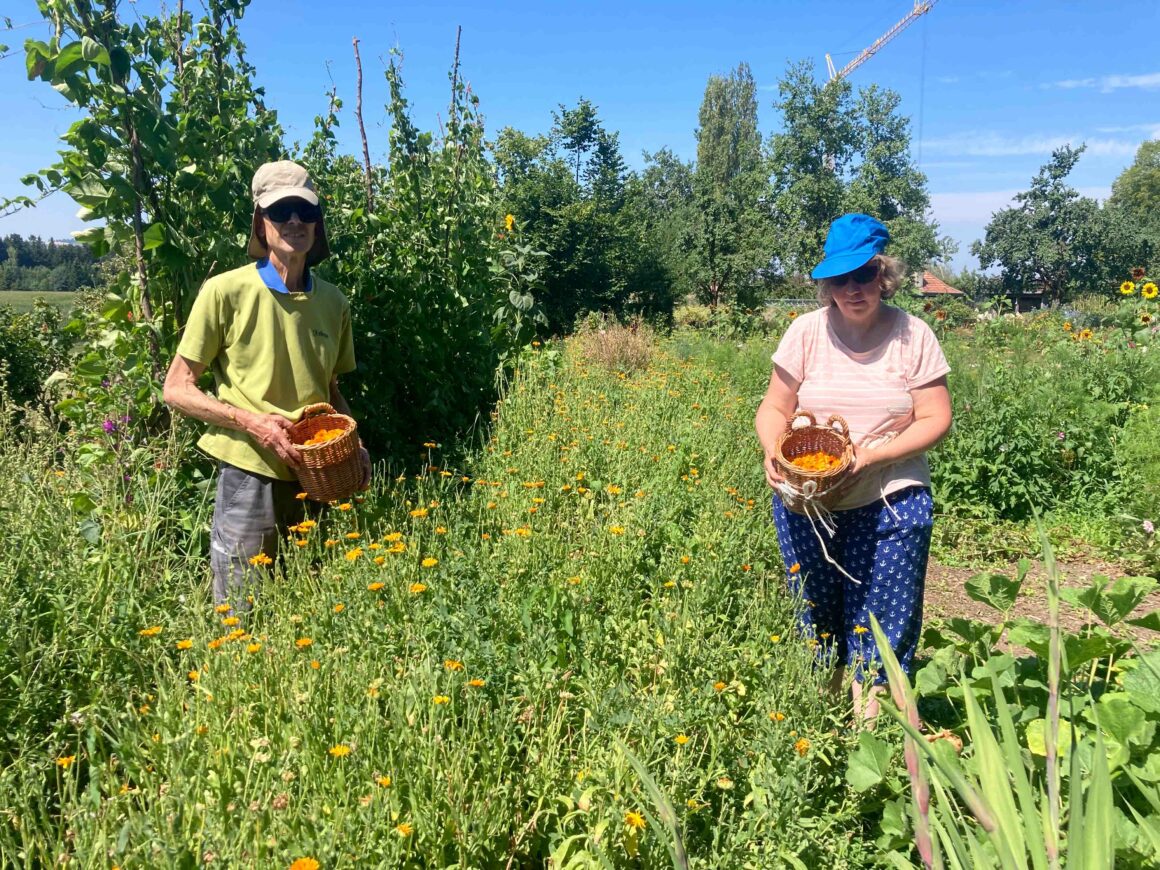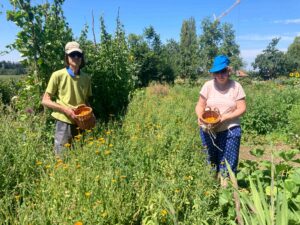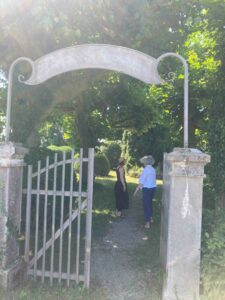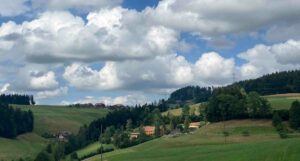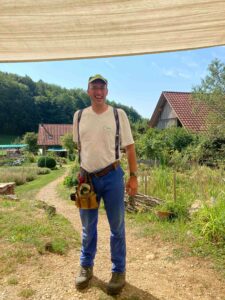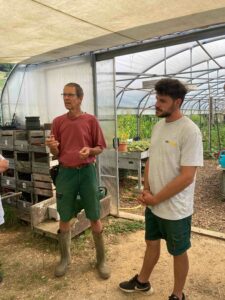“Every encounter is a living situation that has never been there before.”
Impressions of a short trip in Switzerland
In July 2022 we – Stefanie Schälin and Sonja Zausch – made a learning journey in the area around Bern, visiting communities and people in anthroposophical social work. Sonja (leadership member of the Anthroposophic Council for Inclusive Social Development) and Stefanie (leader of the Swiss research project “Contributions of people with disabilities to their social environment”) also work together for the project “in good company – living inclusion” of the German Anthropoi Federation. Coming from these different perspectives, the intention of the visits was to gain insight into current issues, challenges, but also visions for the future in the places of living practice. We were particularly interested in the topic of inclusion and participation in the sense of the UN Convention on the Rights of Persons with Disabilities (UNCRPD) and the attitude of the communities.
The first institution visited was the Lebens- und Arbeitsgemeinschaft Humanushaus in Rubigen. During a guided tour of the farm and nursery we got to know the dedicated worker Adrian. He told us proudly and happily that he likes working here because it is varied work, he enjoys working with people with and without support needs, and he is grateful to be able to work at his own pace:
Picture 1: In the garden of the Humanushaus we met two people who were mindfully picking marigolds for tea production.
Picture 2: Did you know that there is a small cemetery that belongs to the Humanushaus? This will remain in our memory as a place of devotion and silence.
In a round of talks with staff from Humanushaus, we discussed the question of how we personally and the people we accompany are connected to the world. It quickly became clear how complex this issue is. The Humanushaus presents itself as a community with village character, whereby interpersonal encounters and the resulting bond form essential everyday experiences. On the site, you will meet people who are engaged with life, and an attitude where all perspectives are included as valuable. One participant in the discussion raised the question of whether this “Humanus world” is not too small and whether it needs to be opened up. On the one hand, there is a desire to intensify inclusive spaces beyond Humanushaus, meaning a gesture of opening up to society. On the other hand, there is the concern to preserve the achievements of the meaningful and structuring place of work and residence with its anthroposophical qualities. How this tension can be countered remained and remains an open question. It is clear that many other communities are also in this ambivalent situation at the moment.
This challenge was also the topic at the institution we visited next, Haus St. Martin in Emmental. Geographically, this place is so remote that there is no connection to public transport, which is rare in Switzerland. Many residents have been living here for a very long time and one difficulty is the ever decreasing social network of the accompanied people with support needs. All the more importance is attached to the culture of relationships and to meeting at eye level. The resulting tension between closeness to people on the one hand and professional distance on the other is a present part of everyday work.
In an inclusive roundtable discussion, we talked about the morning circle and how it might look today. The traditional morning circle with compulsory attendance and thoroughly organized elements is neither up-to-date nor compatible with the UN Convention on the Rights of Persons with Disabilities. Nevertheless, there is a desire for morning rituals of togetherness. Elements for this could be, for example, a piece of music, singing together or sounding the singing bowl as an artistic element. It is also conceivable that the Soul Calendar will be read aloud, although its translation into simple language is still pending.
Picture 3: In the middle of the hilly landscape of the Emmental is the Haus St. Martin.
Picture 4: Caroline eloquently showed us her place of living and residence, the Haus St. Martin.
The last institution we visited was the Buechehof in Lostorf. In large steps and expertly giving information we were led by Sämi through the garden. He repeatedly emphasized the extent to which the work and the resulting products are allowed to go out into the world for sale. This awareness of value chains and social participation permeates many areas of the Buechehof: the sale of vegetables at an inclusive market stall in town, the public farm store, the takeover and conversion of the village kiosk into an inclusive sales outlet with café operations, or the opportunity for three people from the Buechehof to work externally in village-based companies are all testimony to this. It is noteworthy that the demand for the farm’s products is significantly higher than what can be produced.
Picture 5: Sämi also lends a hand himself when delivering products from the Buechehof. He likes the contact with the customers.
Picture 6: Talking together about the employment opportunities for people with support needs at Buechehof: “We call it work!”
There seems to be no lack of innovations, ideas and implementations at the Buechehof. However, this success also has its downsides. Sonya, a member of the four-person leadership team, tells us that right now they are getting more requests from people with support needs than they are allowed to provide spaces for, even though they have the capacity for more. Using the example of the lengthy process of installing an official sign as a guide to the Buechehof at the road crossing, it becomes clear that recognition must also be fought for again and again and constantly.
It should also be noted that so-called career changers in the field of social therapy were special interlocutors for us. Perhaps discovering work and life with people with support needs can be perceived as fateful, in the sense of that here satisfaction can be experienced and longings can be fulfilled which people search for many years in other work environments and find in the anthroposophical social contexts. The effect of relationship is perhaps the central finding – and this means relationship and culture to nature, to living, to care, to health, to food, to rituals, between animals and people, and much more.
In addition to the visits to communities, we also met with other active people around anthroposophical social work. So we took a look at the inclusive Atelier Rohling in the city of Bern and got to know the artist Clemens Wild who works there. He lives in the Humanushaus and works three days/week in the studio as an artist. His work is sold on the open art market and he has a strong desire to make his work equally visible in public spaces.
We talked to social pedagogue and cultural manager Andrea Brill, who is in the process of setting up an inclusive cultural meeting space and is pursuing the vision of a “unlearning workshop”.
As a conclusion of this learning trip, we visited the expert consultant for autism Pascale Karlin in the Bernese Jura. Surrounded by her wonderful permaculture garden, she tells us how important the dialogical and the immediacy are in a meeting: “Every encounter is a living situation that has never been there before”.
In all the people and communities visited, we experienced this vitality of an encounter. There was also a palpable gratitude for being allowed to linger for a moment in a (non-intentional) conversation space, in order to then express what is currently touching or connecting one, or what wishes or visions for the future might be: whether this be the intensification of inclusive exchange beyond the institution, the affirmation of an anthroposophical (basic?) attitude, the importance of the culture of relationships, or the ongoing further development of one’s own impulses.
And so this little trip in Switzerland has helped to give all the participants the happiness of a common exchange. We would like to continue this dialog. If you would like us to come and visit you or if for any other reason we have aroused your interest, please do not hesitate to contact us. We are looking forward!
Stefanie Schälin (stefanie.schaelin@gmail.com)
Sonja Zausch (s.zausch@inclusivesocial.org)

